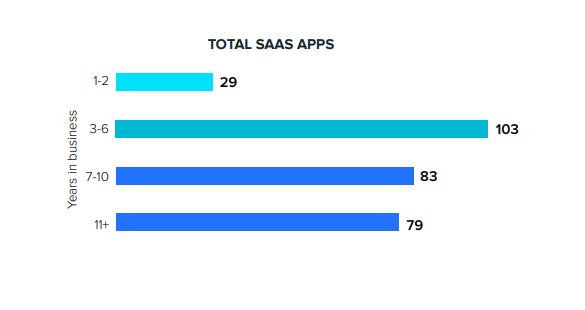In today’s business landscape, companies rely heavily on various software tools to meet high-quality business needs. Research shows that in the first two years, companies typically use dozens of programs, with this number growing rapidly before stabilizing as they transition to unified software solutions.
According to BetterCloud Research, young companies (one to two years old) start out with 29 apps on average. By the time they’re three to six years old, that number spikes to 103.

Source: BetterCloud
The surge in software usage is driven by the need for specialized tools like project management, accounting, inventory control, CRM, and more. However, instead of optimizing operations, this multitude of software often leads to fragmentation and complexity. The result? Significant inefficiencies, increased costs, and elevated security risks, all of which burden IT departments.

Source: BetterCloud
The Advantages of Odoo as a Unified System
Considering this, Odoo offers undeniable advantages as a comprehensive solution.
Economic Efficiency
Odoo consolidates multiple functions into one platform, eliminating the need for numerous software subscriptions and reducing unnecessary IT expenditures. Studies indicate that up to 40% of SaaS licenses are underutilized or wasted.
"Far too often, organizations pay for SaaS licenses and subscriptions they don’t actually need. The average organization is only utilizing 60% of their provisioned licenses, leaving 40% wasted, unused, and ripe for optimization."
Increased Productivity
With all programs integrated into a single system, employees no longer need to juggle multiple interfaces, allowing them to focus more on critical business tasks.
Enhanced Data Reliability
Managing data within a single system reduces errors that occur during information transfer between different platforms, improving accuracy and process control.
Simplified Maintenance
A unified system like Odoo simplifies IT support, updates, and security management, freeing up your IT team to focus on strategic initiatives.
Scalability
Odoo grows with your business. As your company expands, you can easily add new modules, ensuring seamless operation.
Improved Coordination
A single system enhances team collaboration, leading to smoother and more effective project management.
Simplified Decision-Making
Odoo provides unified data and analytics, making it easier for corporate managers to make informed decisions. Real-time access to information ensures timely responses to potential issues.

Replacing Multiple Systems with Odoo
Here’s a look at what standalone programs Odoo can replace:
- Accounting Software: Replace QuickBooks, Xero, Sage, or NetSuite with Odoo’s comprehensive accounting tools.
- CRM: Transition from Salesforce, HubSpot, or Zoho CRM to Odoo’s integrated CRM module.
- E-commerce Platforms: Opt for Odoo’s e-commerce module over Shopify, Magento, or WooCommerce.
- Project Management Tools: Replace Trello, Asana, or Monday.com with Odoo’s project management features.
- HR Systems: Optimize HR processes with Odoo, replacing systems like BambooHR or Workday.
- Inventory Management: Integrate inventory control with Odoo instead of using TradeGecko or NetSuite.
- POS Systems: Utilize the Odoo POS module instead of Square or Lightspeed.
- ERP Software: Replace SAP or Oracle NetSuite with Odoo’s ERP functions.
- Website Builders and CMS: Create websites and manage content using Odoo instead of WordPress or Wix.
- Marketing Automation: Use Odoo’s marketing tools in place of Mailchimp or HubSpot.
- Helpdesk and Support: Opt for Odoo’s support module over Zendesk or Freshdesk.
- Document Management: Manage documents with Odoo, replacing SharePoint or Google Drive.
If you’re looking to optimize and organize your business, contact us to learn how to implement Odoo swiftly and efficiently.
Conclusion
Avoid the exponential growth of programs that can complicate your operations. By consolidating your business tools with Odoo, you can streamline your work, enhance efficiency, and scale your business more effectively.
If you're looking to optimize and streamline your business, get in touch with us to learn how Odoo can be implemented quickly and with minimal effort.